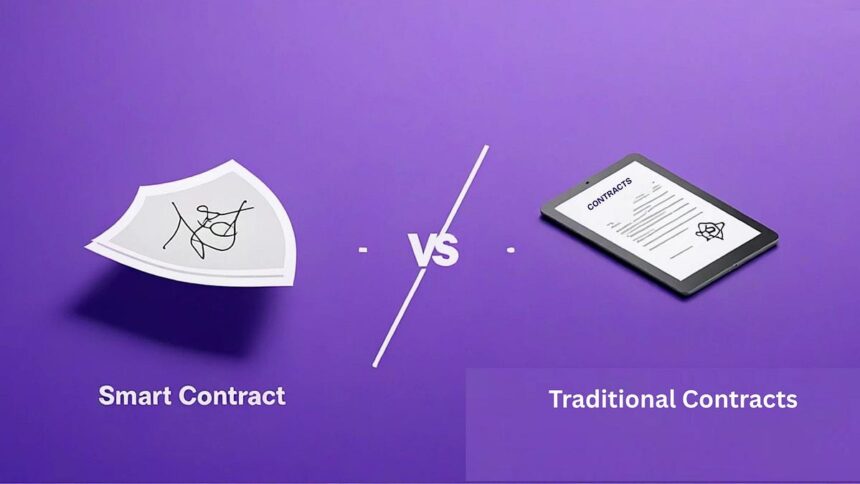In the evolving world of business agreements, the shift from traditional contracts to smart contracts is a topic of growing interest. For businesses considering new ways to manage agreements, understanding the differences between these two approaches is essential. This comprehensive guide will walk you through the fundamentals, key differences, practical implications, and the future of contracts in the digital era. If you are a business leader or a decision-maker exploring smart contract solutions, this blog will provide clarity and actionable insights.
Contracts are the backbone of business relationships. They define obligations, protect interests, and provide a framework for resolving disputes. Traditionally, contracts have been written on paper, signed by hand, and enforced through legal systems. However, with technological advancements, a new form of agreement has emerged: the smart contract.
Traditional contracts are legally binding agreements between parties, typically written in natural language and enforced by law. They can be verbal or written, though written contracts are preferred for clarity and enforceability.
Key Features of Traditional Contracts:
- Written in human language
- Require signatures (physical or electronic)
- Enforced by courts or arbitration
- Often involve intermediaries such as lawyers, notaries, or banks
- Can be amended or terminated by mutual consent
Common Use Cases:
- Employment agreements
- Sales contracts
- Lease agreements
- Service contracts
Smart contracts are self-executing agreements with the terms directly written into code. They run on blockchain platforms, where the contract automatically enforces itself when predefined conditions are met.
Key Features of Smart Contracts:
- Written in computer code
- Deployed on a blockchain
- Automatically execute actions when conditions are met
- Do not require intermediaries
- Immutable once deployed (cannot be altered)
- Transparent and auditable by all parties
Common Use Cases:
- Automated payments
- Supply chain management
- Decentralized finance (DeFi)
- Token sales and crowdfunding
Traditional Contracts:
Execution depends on the parties fulfilling their obligations, often requiring reminders, follow-ups, and sometimes legal intervention. For example, a payment might be due upon delivery, but if one party delays, the other must chase them or seek legal recourse.
Smart Contracts:
These contracts execute automatically when conditions are met. For instance, if a shipment is confirmed delivered by an oracle, payment is released instantly-no manual intervention needed.
Traditional Contracts:
Terms are only as transparent as the parties allow. Sometimes, information asymmetry or unclear language leads to misunderstandings and disputes.
Smart Contracts:
All terms are visible on the blockchain to all involved parties. This transparency builds trust, as everyone can verify the contract’s logic and conditions at any time.
Traditional Contracts:
Processing, negotiation, and execution can take days or weeks, especially when multiple intermediaries are involved.
Smart Contracts:
Execution is near-instant. Once the inputs are received, the contract completes its programmed actions without delay.
Traditional Contracts:
Legal fees, administrative costs, and the involvement of third parties make traditional contracts expensive. Each step-drafting, reviewing, notarizing, and enforcing-adds to the cost.
Smart Contracts:
By removing intermediaries and automating processes, smart contracts significantly reduce costs. The main expenses are development and blockchain transaction fees
Traditional Contracts:
Paper contracts can be altered, forged, or lost. Even digital documents are not immune to tampering unless secured with advanced technology.
Smart Contracts:
Once deployed, a smart contract cannot be changed. This immutability protects against unauthorized alterations, though it also means errors in the code are permanent and must be carefully avoided.
Traditional Contracts:
Enforcement relies on legal systems. If a party breaches the contract, the other must go to court or arbitration, which is time-consuming and costly.
Smart Contracts:
Enforcement is automatic. The code executes actions as programmed, leaving little room for dispute. However, legal recognition of smart contracts varies by jurisdiction, and some agreements may still require legal backing for certain aspects.
Traditional Contracts:
Often constrained by jurisdictional boundaries, requiring knowledge of local laws and sometimes translation.
Smart Contracts:
Accessible globally, allowing parties from different countries to do business without worrying about local legal systems. This democratizes access to business opportunities.
Traditional Contracts:
Vulnerable to forgery, loss, or unauthorized changes unless protected by secure systems.
Smart Contracts:
Secure by design, as blockchain records are tamper-resistant. However, poorly written code can introduce vulnerabilities, making it essential to work with experienced developers.
Traditional Contract Example:
A supplier and retailer sign a paper agreement for monthly deliveries. If a delivery is missed, the retailer must contact the supplier or seek legal help to resolve the issue.
Smart Contract Example:
A smart contract on a blockchain automatically releases payment to the supplier when the delivery is confirmed by a trusted IoT device. If the delivery is not made, the payment is withheld, and both parties can see the status in real time.
- Complex agreements requiring human judgment or negotiation
- Situations where legal enforceability is paramount
- Agreements involving parties unfamiliar with blockchain technology
- Cases where regulatory compliance requires traditional documentation
- Repetitive, rule-based transactions
- Automated payments and settlements
- Supply chain tracking and verification
- Decentralized applications (DApps) and blockchain-based businesses
- Reduced Costs: No need for intermediaries means lower expenses.
- Faster Transactions: Automation speeds up execution.
- Increased Trust: Transparency and immutability build confidence among parties.
- Global Reach: Do business with partners worldwide, regardless of location.
- Auditability: Every action is recorded on the blockchain, making audits straightforward.
- Legal Recognition: Not all jurisdictions recognize smart contracts as legally binding.
- Code Quality: Bugs or vulnerabilities in the code can lead to financial losses.
- Complexity: Not suitable for all types of agreements, especially those requiring subjective judgment.
- Irreversibility: Mistakes in the contract cannot be easily corrected once deployed.
Consider the following questions:
- Is the agreement straightforward and rule-based?
- Do you need automation and instant execution?
- Are the parties comfortable using blockchain technology?
- Is legal enforceability in a specific jurisdiction required?
- What are the costs and risks associated with each approach?
If you decide that smart contracts are right for your business, choosing the right Smart Contract Development Company is crucial. Look for a company with:
- Proven experience in blockchain and smart contract development
- Strong security practices and code auditing
- Understanding of your industry and specific needs
- Transparent communication and project management
- Support for deployment and ongoing maintenance
A professional Smart Contract Development Company will guide you through:
- Assessing your business requirements
- Designing contract logic and workflows
- Writing secure, efficient code
- Testing and auditing for vulnerabilities
- Deploying contracts on the appropriate blockchain
- Providing support and updates as needed
Supply Chain Management:
A global logistics company uses smart contracts to automate payments when shipments reach their destination. This reduces delays, disputes, and paperwork.
Real Estate Transactions:
Property sales are managed through smart contracts, where funds and ownership documents are exchanged automatically upon meeting agreed conditions.
Insurance Claims:
Insurance providers automate claim payouts based on data from trusted sources, reducing fraud and speeding up settlements.
While smart contracts offer many advantages, businesses must consider:
- Local laws regarding electronic contracts and signatures
- Data privacy regulations
- Tax implications of blockchain transactions
- Dispute resolution mechanisms for smart contract failures
Consulting with legal experts and a reputable Smart Contract Development Company can help navigate these complexities.
As blockchain technology matures, smart contracts are expected to become more prevalent, especially in industries that value automation, transparency, and security. However, traditional contracts will continue to play a vital role where human judgment and legal nuance are required.
Smart contracts and traditional contracts serve the same fundamental purpose-defining and enforcing agreements between parties. However, their methods, strengths, and limitations differ significantly. Smart contracts offer automation, transparency, speed, and cost savings, making them ideal for many modern business applications. Traditional contracts remain essential for complex, nuanced, or heavily regulated agreements.
For businesses exploring new ways to manage agreements, understanding these differences is the first step toward making informed decisions. By partnering with an experienced Smart Contract Development Company, you can unlock new efficiencies and opportunities for your organization.
If you’re considering smart contracts, partner with a trusted Smart Contract Development Company like Codezeros. Our team specializes in designing, developing, and deploying secure smart contracts tailored to your business needs. Take the next step toward efficient, transparent, and automated agreements-contact Codezeros today to discuss your project.










